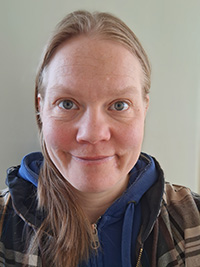Institute for Health promotion research
Institute head
- Univ.-Prof. Priv.-Doz. Dr.med.univ. Thomas E. Dorner, MPH
Haus der Barmherzigkeit Clementinum
Paltram 12
3062 Kirchstetten
gesundheitsfoerderung@karl-landsteiner.at
Deputies
- Mag. Dr.rer.soc.oec. K. Viktoria Stein
gesundheitsfoerderung@karl-landsteiner.at
Team
Thomas Dorner is the head of the Institute for Health Promotion Research and is the clinical director of the Health Centre Sitzenberg. He is also a researcher at the Center for Public Health at the Medical University of Vienna and Guest Researcher at the Swedish Karolinska Institutet. As president of the Austrian Public Health Association (ÖGPH) he has been a member oft he governing of EUPHA since 2021, and currently is also treasurer of EUPHA. His many research topics and publications range from the management and prevention of chronic pain or frailty to the impact of diseases on work ability or the social determinants of health promotion.
Viktoria Stein is assistant professor at the Leiden University Medical Centre, the research lead for the Health Centre Sitzenberg and deputy head of the institute. She has worked widely across the topics of integrated care design, implementation and evaluation, governance and wokforce competencies, among other topics. As a consultant, she collaborates with the World Bank, WHO, and other international development corporations to support health promotion and prevention measures on all levels.
Veronika Schauer is home manager at Haus der Barmherzigkeit Pflegezentrum Clementinum. Previously, she was head of the Quality Management Department and the Academy for Ageing Research at Haus der Barmherzigkeit.
She studied medical informatics at the Vienna University of Technology and completed the university course in health management at the Danube University Krems. At KLI, she supports empirical research on health promotion in particular.
Publications (excerpt)
- Gesundheitsförderung und Klimaschutz zusammen denken
https://www.mdpi.com/1660-4601/21/1/110
Stein, KV; Dorner, TE. From Health-in-All-Policies to Climate-in-All-Policies: Using the Synergies between Health Promotion and Climate Protection to Take Action. Int J Environ Res Public Health. 2024 Jan 18;21(1):110. https://doi.org/10.3390/ijerph21010110 - Mehr Bürgerbeteiligung für bessere Gesundheitsversorgung
Fastl, C; Stein, V. Gesundheit partizipativ gestalten. In Hager, L; Hahn, U; Knieps, F; Klapper, B; Lutz, B; Simon, B; Nüsken, J. (Hrsg.). Gemeinschaftsprojekt Gesundheit. Wie Value-Based Care das Gesundheitswesen neue erfinden kann. BMC Schriftenreihe Band IX. Medizinisch Wissenschaftliche Verlagsgesellschaft Berlin 2024, S. 271-282. - Ganzheitliches Trainingsprogramm für soziale und persönliche Entwicklung
https://www.mdpi.com/1660-4601/21/12/1654
Janka, C; Höcker, M; Dorner, TE. The Relationship Between Body, Mind, and Social Characteristics in a Sample of a Training Program for Developing Social and Personal Resources: A Network Analysis.
Int J Environ Res Public Health. 2024 Dec 11;21(12):1654. https://doi.org/10.3390/ijerph21121654. - Zeitliche Entwicklung des Defizits bei den (I)ADLs in der österreichischen Bevölkerung ab 65 Jahren https://link.springer.com/article/10.1007/s00508-024-02388-4
Woldemariam, S; Stein, KV; Haider, S; Dorner, TE. Trends over time in the deficit of (instrumental) activities of daily living in the Austrian population aged 65 years and older: Results from the Austrian Health Interview Survey series. Wien Klin Wochenschr. 2024 Sep;136(17-18):488-496. https://doi.org/10.1007/s00508-024-02388-4 - Gesundes Altern fördern
https://www.thieme-connect.de/products/ejournals/abstract/10.1055/s-0044-1794386
Dorner, TE. Gesundes Altern fördern: Gemeinschaftliche Entwicklungsperspektiven und integrative Lösungen. Gemeinsamens Symposium der Kompetenzgruppe Gerontologie der ÖGPH und der Sektion Gerontologie der ÖGGG. Gesundheitswesen 2024; 86(S 05): S345-S346. DOI: 10.1055/s-0044-1794386. DOI: 10.1055/s-0044-1794386
Work at the Institute
The Karl Landsteiner Institute for Health Promotion Research aims to be the foremost research institute for health promotion and prevention in Austria. Its focus lies on lifestyle-based health promotion and the translation from theory into practice.
Health Promotion and Prevention
Health promotion aims to promote health, no matter what the health status is. The guiding principle is that one can always get healthier. Health is gained through the identification and strengthening of health resources. In order to achieve this, health promotion uses a combination of individual and community measures: motivating the individual to lead a healthier lifestyle and also creating the conditions to make these choices the easiest option.
In contrast, prevention aims to identify and reduce health barriers. The focus is e.g. on tackling diseases, adress work ability, counteract a reduction of quality of life or premature mortality. While it is of paramount importance to differentiate between the focus on health as opposed to the one on disease, in practice, many instruments and measures are of equal relevance.
Research programme of the Institute for Health Promotion Research
As mentioned above, the main focus of work is on lifestyle-based health promotion. Five areas of research were defined, in parallel tot he five areas of interventions at the Health Centre Sitzenberg:
- Physical activity
- Nutrition
- Mental health
- Social capital
- Health literacy
Key concepts, which further guide our research are the social determinants of health, health inequalities and the interrelationship of the different elements, whether mutually reinforcing or further debilitating. These topics are tackled within four work streams:
- Research and evaluation of the programme in the Health Centre Sitzenberg
- Health promotion research for the Austrian Social Secruity Institutions
- Cooperations with external partners
- Research funded through research grants
Research methods
Complex topics ask for complex research methods, which is why we apply both quantitative and qualitative methods to conduct our research projects.
Quantitative methods include randomised controlled studies(RCTs), which are still the gold standard in health promotion research as well. Cohort studies are the more common instrument, and a main focus of the Insitute, taking advantage of the collaobration with the Health Centre Sitzenberg. Another method used are longitudinal studies and longitudinal series, which provide research results within a relatively short time frame. Both existing and new databases will be used for lifestyle-related health promotion research.
Most research questions ask for a more in-depth understanding of the motivations and relationships behind the quantitative data. This is where interviews, focus groups and participatory research provide insights and support the interpretation of data. The participation of patients, caregivers or community members in the design, implementation and evaluation of research projects is of growing importance and is included in all our research designs.
Photos

Thomas E. Dorner, MPH

K. Viktoria Stein




